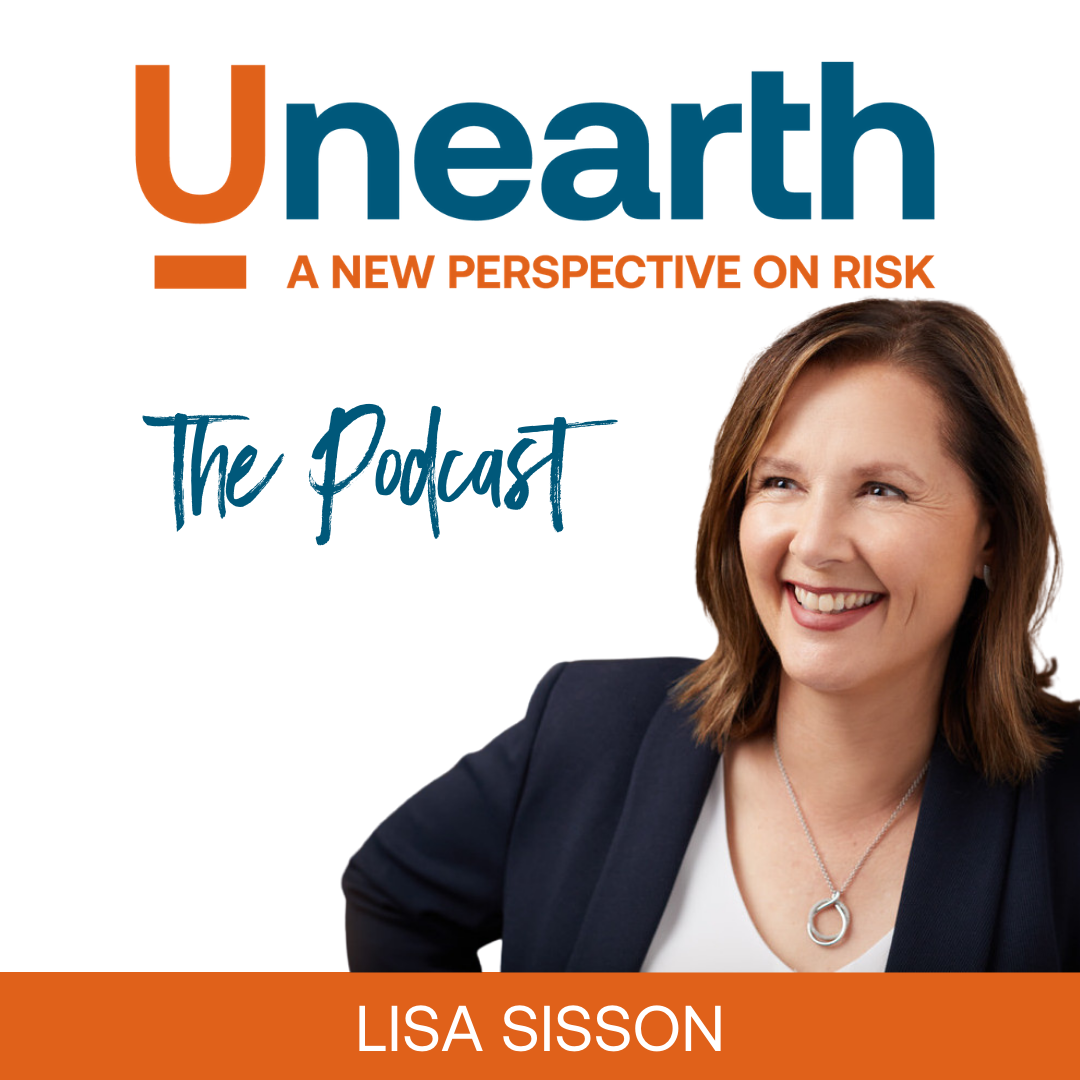
1.4K
Downloads
36
Episodes
As the title suggests, this podcast is all about unearthing a new perspective on risk. My guests are experts in their fields where they impact risk either directly or indirectly. My interviews aim to lift the lid on risk and rip it apart to give you a whole new perspective on it. My name’s Lisa Sisson and I am founder of risk consultancy, Unearth. I’m also becoming known somewhat as a “Risk Rebel”. At Unearth we believe that risk starts and ends with people. Equally, we believe that opportunity starts and ends with people. So if you’re not looking at risk with, through and by your people, then you are not only leaving your organisation exposed to risk, you are also not opening up the opportunities that a people-centred risk strategy will deliver.
Episodes
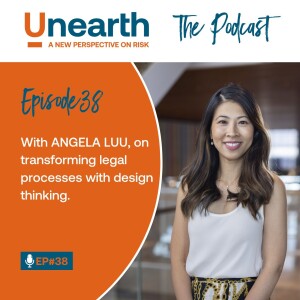
Sunday Jun 09, 2024
Sunday Jun 09, 2024
When you think about inviting a lawyer onto a podcast with a risk management rebel, you might expect a snooze fest. But if you know our host, Lisa, you know she’s always about shifting perspectives and uncovering golden opportunities for you, our listeners.
In this episode, Lisa is joined by Angela Luu, the senior manager in Herbert Smith Freehills’ (HSF) innovative Digital Legal Delivery Team, specialising in ‘Legal Design.’
So, what is ‘Legal Design’? According to Angela, it's “the application of the designer's mindset, methods, and techniques to law to improve the usability of legal communications and content.” Angela shares how her unique interests have propelled her to lead this groundbreaking area, transforming traditional legal documents, like ‘Terms and Conditions,’ into clear and accessible tools. For too long, legal documents have created barriers and confusion. Rethinking their creation can revolutionize their impact, making them truly user-friendly. Because at the end of the day, legal documents and agreements are for people.
Angela busts some myths along the way, while she and Lisa explore how ‘Legal Design’ can enhance legal processes, align with organisational identities, and deepen client understanding for greater success. Topics discussed include:
- The perception of lawyers as part of a privileged world.
- The challenges of working in a digital age with content overload, especially for lawyers.
- Navigating the attention economy where every platform vies for our focus.
- The competition lawyers face when sharing useful, actionable information in a crowded digital space.
- How the Banking Royal Commission has led clients to rethink the drafting of terms and conditions.
- A case study: Unearth's use of the design method in a critical project.
- The evolving role of lawyers in the face of technological advancements and digital service delivery.
- Lawyers moving beyond risk assessment to opening mindsets to opportunities.
- The importance of aligning solution representations with organisational identity to enhance client understanding and satisfaction.
- The evolving skill set of lawyers, incorporating technology, project management, and legal design to provide proactive, creative client solutions.
- Utilising design thinking and empathy mapping to understand client needs, emotions, and motivations for better communication and collaboration.
- The importance of pausing before jumping to solutions to thoroughly understand the problem first.
- The value of asking "why" multiple times to gain deeper insights into challenges.
- The significance of transparency and open communication in creating a safe space for discussing project goals, risks, and opportunities.
- Crafting a narrative that highlights the project's benefits for all stakeholders, avoiding spin.
Join us for an enlightening conversation that will reshape how you work with lawyers and open your eyes to the transformative power of ‘Legal Design.’
If you would like to learn more about Unearth or Lisa Sisson, then please visit unearth.com.au.
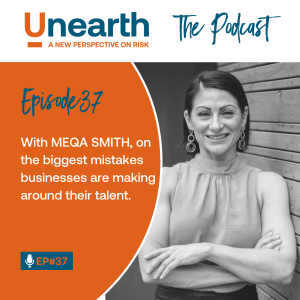
Monday Mar 11, 2024
Monday Mar 11, 2024
In this captivating episode of 'Unearth A New Perspective on Risk,' host Lisa is joined by the dynamic Meqa Smith, Founder of the Unforgettable Agency. Meqa's expertise lies in guiding business leaders through the transformative journey of understanding their talent acquisition strategies.
With a knack for delivering innovative recruitment and engagement solutions, Meqa specialises in helping businesses attract top-tier employees who not only possess the requisite skills but also resonate deeply with the company's values and mission.
For seasoned listeners, Meqa's return to the podcast will be a welcomed reunion, reminiscent of her insightful contributions in Episode 8 where she tackled the essence of reframing the recruitment process—a discussion that remains as relevant as ever.
Since her last appearance, Meqa has been at the forefront of championing a shift in mindset among leaders, advocating for a re-evaluation of how businesses approach talent acquisition and management.
In this not-to-be-missed episode, Lisa and Meqa delve into a plethora of thought-provoking topics, including:
- The imperative paradigm shift demanded of modern business leaders.
- The transformative impact of generative AI on various industries.
- The timeless relevance of understanding human psychology in talent management.
- The critical need to challenge conventional assumptions, including employee engagement strategies.
- The risks associated with recruitment mismatches and the perils of adopting superficial tactics that may disillusion candidates.
- The pivotal role of alignment in leadership (still often missed) and its profound impact on organisational success.
- The significance of discerning a candidate's 'means goals' and 'end goals' in fostering a harmonious workplace culture.
- The compelling analogy of the "Nike Tax" and its implications for recruitment.
- A recalibration of metrics for employee retention, urging a departure from outdated approaches.
This episode is a treasure trove of actionable insights and pragmatic advice, promising to revolutionise your perspective on talent acquisition and recruitment strategies. Whether you're a board member, executive, leader, or recruiter, this conversation is essential listening for navigating the evolving landscape of talent management. Tune in and elevate your approach to talent acquisition today!
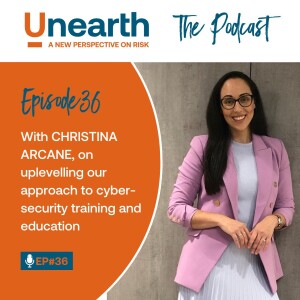
Tuesday Feb 20, 2024
Tuesday Feb 20, 2024
Welcome to the first episode of 'Unearth A New Perspective on Risk' for 2024. This episode offers a fresh outlook on cybersecurity and its intricate relationship with risk management. In this first episode for the year, we're thrilled to present a candid and insightful conversation between Lisa and Christina Arcane, a renowned Cybersecurity education specialist and the Director of InspireCyber.
With years of experience across IT, Cybersecurity, and Privacy domains, including the successful launch of her own Cybersecurity SaaS Startup, Christina is now dedicated to empowering organisations like yours to equip employees with the knowledge and confidence to navigate the complex cybersecurity landscape effectively.
In this thought-provoking discussion, Lisa and Christina explore several key areas of interest to corporate executives:
- The importance of understanding how individuals learn and respond to training, and the challenges posed by technology in our daily lives.
- The significance of the approach to cybersecurity education and the existing gaps that need attention.
- The ongoing need for cybersecurity training and the potential pitfalls of assuming employees already possess the necessary knowledge.
- The role of technical controls in supporting businesses and their employees without creating unnecessary barriers.
- The concept of security by design and the importance of considering human factors at every layer.
- The dangers of complacency and the need for continuous improvement in cybersecurity maturity.
- The importance of early engagement between Project Management and the cybersecurity team.
- The risks associated with email management and the need for robust security measures.
- The benefits and risks of cybersecurity simulations.
- The need for a balanced approach to accountability and the dangers of excessive punishment.
- The challenges posed by organisations that fail to adopt best practices and adequately train their employees.
- Strategies for fostering the right behaviours in both employees and customers.
This episode promises to provide you with valuable insights, practical advice, and a new perspective on cybersecurity and risk management.
We invite you to join us as we delve into these crucial topics and uncover innovative ways to enhance your organisation's cybersecurity posture. Don't miss out on this opportunity to gain a deeper understanding of the evolving cybersecurity landscape and its implications for your business.
If there is anything from this episode you would like to discuss or questions you have, then we would like to hear from you. Visit our website, unearth.com.au
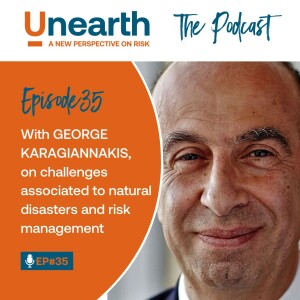
Saturday Jun 24, 2023
Saturday Jun 24, 2023
In this episode, we are joined by a very special guest, George Karagiannakis, the Executive Manager of Government Relations for Insurance Australia Group (IAG). George’s work sees him manage the interaction between IAG and the political world in Australia, at a Federal, State Territory Governments, and to some extent, Local Government. Over the past 24 years George has seen a lot of change in that time, both within the company or within the insurance industry. And on the subject of natural disasters and risk management, George and Lisa explore this topic through the lens of the insurance industry, and also from the various governments perspective.
Over the past couple of years, George and Lisa have had a number of discussions on the challenges Australian’s are facing in relation to the intensity associated with natural disasters, the changing whether as a result of climate change, and the ongoing challenges associated to the response and recovery for communities after a major event. So, they thought it would be a good idea to do an episode and share some of the areas they have spoken about and provide you with insights, especially with George’s unique perspective based on his experience.
Lisa was eager to have this discussion because anyone who has met Lisa, knows that community safety is something she is passionate about, and sets are the heart of her purpose, to create a safe world. She believes it is imperative we are brave and transparent in the tough discussions that are needed, but more importantly, we need to do better in both our approaches to decision making and the actions taken.
Living in our beautiful country also means we are all going to be affected either directly or indirectly on disasters that happen. No one is immune, and we are all part of communities, so we all have a part to play in how we protect ourselves, our families, and our communities. We also know that Government (all levels), industry, non-for-profits, and charities each have a part to play.
Over the years we have seen a lot of frustration captured through community groups and the media as to how the effectiveness of our response and recovery to major natural disasters. As a country that has so much experience with Natural Disasters, so why are we still missing the mark? And considering our country is a large continent with a small population, why don’t we have a unified approach? After all natural disasters don’t stop at state boundaries. Is our bureaucracy getting in the way of how communities are being supported through and after an event?
Lisa and George cover a number of points including:
- George’s thoughts on the development of Government policy and initiatives on natural disaster risk reduction since the 2010 Qld floods, including since the Royal Commission.
- The National Action Plan for natural disasters.
- The forming of NEMA (National Emergency Management Agency) last year.
- How do we plan for climate change? Weather patterns changing, meaning new types of risks to established communities (e.g. cyclones moving south).
- When do we start exploring and acting on potential implications, before they happen or wait until after the event (e.g. need for changing in building codes).
- The importance of data and how it’s used, especially to build confidence.
- Understanding risk and reducing risks.
- Communities that are vulnerable of repeatable exposure to harm, and why future land planning needs a rethink.
- The role we all have to play… governments, industry and personal responsibility as homeowners.
- The need for a unified response and common language.
- Planning under blue skies and the need for a playbook, specifically create for that community.
- Complacency creating issues – the ease of forgetting, as we move from floods issues to upcoming bushfires.
- The need to do better moving forward. Is there hope?
There is a need to do better as we move forward, move beyond the many reviews, and truly learn from our past experiences, but also prepare early for the changes that are coming. We all know that we need to improve, all the reviews have shared that; so, is there hope that we finally will? Can we come together as one country and find commonality so we can improve how we can all contribute?
We all have a part to play… do you know your role?
If there is anything from this episode you would like to discuss or questions you have, then we would like to hear from you. And maybe we can get George back in for another discussion based on some of your questions.
Remember, now is the time to plan and coordinate, ‘under blue skies’… together.
We would love to hear your thoughts on this important topic. Reach out to our team at www.unearth.com.au
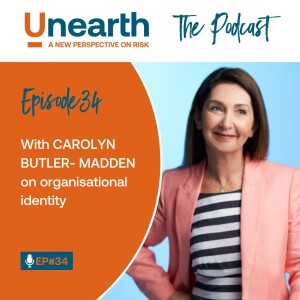
Monday Jun 05, 2023
Episode 34: With Carolyn Butler-Madden, on organisational identity
Monday Jun 05, 2023
Monday Jun 05, 2023
We are thrilled to welcome back Carolyn Butler-Madden, the “Chief Purpose Activist” from her Purpose Consultancy, The Cause Effect. Carolyn last spoke with us almost two years ago on Episode 4, on the Power of Purpose within Organisations.
Since then, Carolyn has released her second book, “For Love & Money” which was a winner in the ‘Social Responsibility’ category of the Australian Business Book Awards in 2022.
The work Carolyn and her business does is important, helping businesses and organisations get really clear on their purpose and embedding it into their business and their strategy.
In this episode we discuss the importance of your unique organisational identity and how it needs to sit at the heart of your business.
There is no denying that there has a shift in what employees, customers, and investors are expecting from businesses today, and purpose has become an important focal point which sits within an organisational identity. Doing this well provides incredibly opportunity, though doing it half-baked leads to risk and even being exposed.
Today, the most successful businesses, the ones that are financially outperforming their counterparts, are businesses with a clear sense of purpose. We are not talking about businesses who state, we've got a purpose... that they have a "why" statement. Not a statement that just gives context to what you already do with an angle, which is still the case for many companies. Carolyn shares is as "purpose today is about the change you want to create in the world, through and beyond your products and services. It is your North Star. It is what you are in service of, you are not constrained. Your products and services are your means to achieve it. But you're not constrained by them."
Businesses who were leaning into purpose as part of their core, their organisational identity, are finding there is value in sharing their stories. It allows them to identify with their people, "people like us" (Seth Godin quote), who believe things like this. It is important to understand what the undercurrent is, that belief, that attracts people to your organisation and to your brand. It is equally important to understand what attracts you to your people. No doubt their skills and everything. But usually, there's something else as well. It's an attitude, most successful purpose led organisations, they have got such clarity on their identity.
Here are some of the points covered during Carolyn and Lisa’s discussion:
- Your 'North Star' - how being a degree or more off through misaligned leaders is diluting the value of an organisational identity and creating risk.
- Do you know what the stories, the narrative, that is being shared about your business? Both within the business and externally?
- The Iceberg analogy - the business that are financially outperforming their counterparts, are businesses with a clear sense of purpose, beyond the tip of an iceberg.
- Businesses leading the way (successful, celebrated and loved) and punching above their weight, resulting in disrupting their categories.
- Identity, purpose and story-leadership (story-telling & story-weaving), spoken by your people, products and services.
- Unleashing the full potential of your people and understanding the risk associated to disengagement.
- What connects you? (the shared narrative)
- The power of emotional bonds.
- Are you there to lead change?
Now is the time for businesses, regardless of size and sector, to ensure you and your business have clarity on your organisational identity, and that it is embedded in everything you do... every decision and action. Because if you don't, then you could find yourself, your people and the way you operate is in conflict with your organisational identity. Creating unnecessary risks and confusion.
Now is the time to act, 'under blue skies', and bring your trusted team and consultants together to ensure you have a plan and approach are aligned so you can offer your team and the marketplace your best efforts and performance.
If you would like to learn more about Unearth or one of our partners, then we would love to hear from you. Feel free to reach out through unearth.com.au
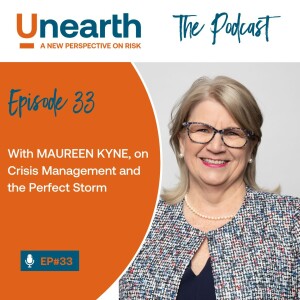
Wednesday Mar 29, 2023
Episode 33: With Maureen Kyne, on Crisis Management and the Perfect Storm
Wednesday Mar 29, 2023
Wednesday Mar 29, 2023
When it comes to risk management for businesses and governments, good Governance is a crucial part. Even with the best intentions and efforts to ensure a business has good Governance and is complying with Regulatory and customer expectations, things can go wrong. A business can find itself needing to manage a crisis. And we have seen many examples recently.
For those businesses that have invested upfront, including in their crisis management plan, all that upfront effort can pay off hugely, and could mean the difference between working through the experience and process, and even though it could be still costly, the exposure to the addition of costly penalties, fines and legal costs are not on the table. These penalties and fines, plus the legal costs can add up to hundreds of thousands of dollars or even millions. Those types of cost could very well cripple a business and see it close its doors for good.
Now, imagine for a moment, even with those looming risks and penalties, that there are still business owners, senior executives, and even board’s that decide not to invest putting the right structures and safeguards in place. Even when these businesses are encouraged to do so, they decide to decline. Perhaps they don’t want the outlay of cost or dismiss the need, as they have done business their way for a long time. They are willing to throw the dice and take the risk.
Well, having to state the obvious, no business is immune to the potential of a crisis happening. In fact, our guest today, Maureen Kyne, has experienced both in helping businesses manage crisis from both camps. Maureen is an Industrial Relations Expert, HR Strategist, Speaker, and Facilitator. Over the last two decades, Maureen has helped her clients through terrible crises. Major injuries, bullying, sexual harassment, discrimination, and gross misconduct. She has seen firsthand the financial, operational, and psychological impacts on her clients and their business.
Maureen is obsessed with making workplaces safe for all employees through proactive education and coaching. She passionately raises awareness of Upward Bullying, an insidious form of bullying that is less known and destructive for organisations.
You can imagine the discussion between Maureen and Lisa as that talk through a number of aspects for you to consider, including:
- The ‘Perfect Storm’ for a crisis.
- The Legislation requirements for all business continues to grow, including more recently the amendments to Fair Work Legislation (Secure Jobs, Better Pay), and Mental Health to name a couple.
- The importance of trust, especially during a crisis.
- The risk of disengagement.
- Building strength and resilience within the business through your people being engaged.
- Upward bullying and the cost when you lose good managers.
- The disruption from poor leadership.
- The trauma from a poor workplace experience.
- Importance of accountability for the executive team.
- People who become victims of poor business cultures, are being affected like warfare (being in combat) and potential for PTSD.
- Exploring both the risks and opportunities available to businesses today.
- A business mindset shift about regulatory changes is required.
Now is the time for businesses, regardless of size and sector, to ensure that you have the right team with skills, knowledge, and experience to support your team. Don’t wait until you are in a crisis, it is too late. Planning now, ‘under blue skies’, is the time to bring your trusted team and consultants together to ensure you have a plan and approach that services your business, your people, and stakeholders well.
If you would like to learn more about Unearth, please visit unearth.com.au.
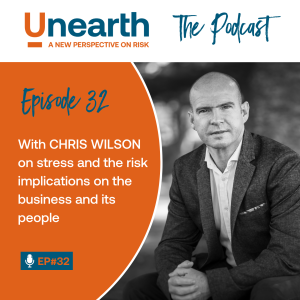
Thursday Mar 09, 2023
Thursday Mar 09, 2023
Yes, we are back with our first episode for 2023. We are excited to have Chris Wilson, a Stress Scientist, join us again for an important discussion on stress, and the risk implications on the business and its people.
Lisa last spoke with Chris back in August 2021 in episode 6, on the science and fluidity behind stress. Chris comes from a background in consulting and mentoring elite groups such as the military, elite sports, performing arts and corporate athletes. He combines systems and data to make informed decisions that catapult a team’s engagement, productivity, and outcomes.
Chris spent the early part of his career working with and developing future leaders, he identified that a necessary part of the success plan is to improve the individual’s performance capacity. This is achieved by adapting capacity in three key areas: physical, mental, and emotional capacity, to enable them to perform their role. Chris helps to develop these three key components to reduce the risk of burnout.
Disengagement is one of the largest and most understated risks businesses face today and has been on an upward trend over the past years. So clearly what we have been doing isn’t working the way we had hoped. And we know that disengagement doesn’t occur as a result of just one thing, so this episode we speak with Chris on what is happening in the workplace in relation to how people are managing stress at the moment.
The discussion takes a few turns and here are some of the points discussed:
- Data and trends – people pushing to the detriment of own health, plus the implications on the physiology of the body.
- Positive vs negative (harmful) stress – stress is fluid and we need to understand the accumulation of stress and the risk to individuals and the business.
- People have different predispositions – why ‘one brush’ approach isn’t suitable.
- Some people enjoy the company, its people, but can’t keep working in what feels like a pressure cooker, it is not sustainable.
- The cost of disengagement to the business.
- People are like dry sponges, absorbing stress from areas we engage, like personal, work, relationships, finances, and media ‘doom and gloom’… there is only so much capacity for stress before it affects us and our health.
- Those struggling can unintentionally load up others in the business trying to carry the workload.
- Are businesses unintentionally setting their people up for failure instead of success?
- There is no one answer (no blue or red pill), but there are things we can do.
Many executives’ associate disengagement with productivity and don’t consider the risk exposure. When employees are disengaged, they are at best satisfied with the bare minimum level of productivity and focus, and we know that lack of attention leads to errors and ‘unintentional’ insider threats.
At the end of the day, it is your people who execute the organisation’s strategy and are responsible for the day-to-day operations and the management of risks. It is only by working with and through your people, being truly engaged with them that the business can achieve goals and performance, solve your organisational risk exposure, and drive transformational change.
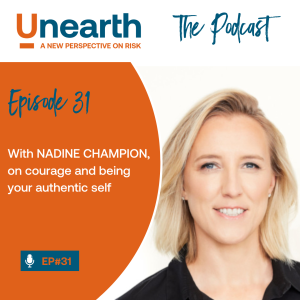
Monday Dec 19, 2022
Episode 31: With Nadine Champion, on courage and being your authentic self
Monday Dec 19, 2022
Monday Dec 19, 2022
It is our last Podcast episode for 2022! Thank you for the support of all our listeners this year and for your gracious feedback.
I wanted to do something extra special, especially because so many of our listeners have been doing it tough this past year. Actually, for most people, it has been a tough few years. Many of you have been pushing through barriers and challenges that you are facing within your workplace and personal lives, often forgetting self-care. Pushing hard extended periods of time comes at a cost, often in the form of fatigue and burn out, which are the types of symptoms that so many people have shared, which is concerning on many levels.
So, when things are tough, a little goodness is needed, which is why I wanted this episode to be like a Christmas Stocking filled with goodies. And the best part about this episode is my special guest, who is one of the nicest and generous people I know, and a wonderful friend. Nadine Champion has joined me to help create this special episode.
Nadine is a Courage Creator and Resilience Revolutionary. Nadine is one of the most popular speakers we have locally and internationally. She is a mindset coach, champion kickboxer & martial artist with over 35 years of experience. Nadine’s wholehearted mission is to help people get back up, leave life’s dressing room, and courageously create a life they love.
Rising to prominence by doing her first ever public speaking event in front of 2,500 people, Nadine was the closing speaker for TEDx Sydney with a speech entitled “10 Seconds of Courage”. She took a giant swing at creating a new life as she demonstrated the mindset tools that had led to her success but were also instrumental in her resilient recovery from cancer. The presentation’s much talked about grand finale changed the course of her life, launching a successful professional speaking career and seeing her author a book, also titled “10 Seconds of Courage”.
Nadine and I could talk for hours. I am always inspired whenever we do talk, and I am sure you will be also. Some of the points we chatted about included:
- Going from wearing armour to being your authentic self.
- Conflict within ourselves. Misalignment with our own integrity, it is exhausting.
- Taking big swings and taking a chance, because when you do nothing… nothing happens.
- The Nudist camp, a metaphor for freedom of being oneself verses cultural conditioning.
- Managers and leaders being genuine and authentic because people notice there is something off when you don’t.
- Open to learning and finding good, valuable, and wise teachers, including a couple of books we discussed, “The Way of Integrity” by Martha Beck and “Extreme Ownership” by Jocko Willink, where Jocko shares the danger of arrogance (over-confidence).
- Your title or rank shouldn’t be what defines you.
- The importance of connecting and listening to your team. Mistakes can be made when you don’t.
- No innovation without mistakes and a safe zone to work and learn within.
- ‘10 Second of Courage’ speaking opportunities often provides insights into company’s culture.
- Organisations don’t consider how their people feel? Or how does their organisation make their people feel?
People are our greatest resource, so looking after ourselves and others is incredibly important. The last few years has done a lot of harm to many, and perhaps you feel you are one of those people. Take a moment to imagine how different your life could look if invested the time to truly understand yourself and live your most genuine and authentic self. That does not mean taking away from others, because for those who truly go deep and understand the process, you can create space for yourself and others. It can be a tough and confronting road, but the most rewarding.
My wish for you is to find some time to step back from the chaos and do some self-care. Also, treat yourself to something special, because you are worth it.
Now, if like Nadine and myself, you are open to learning and finding good, valuable, and wise teachers, then you might find the below resources and links of value.
- 10 Seconds of Courage – Book by Nadine Champion
- 10 Seconds of Courage – TEDx Sydney by Nadine Champion
- The Way of Integrity – Book by Marth Beck
- Extreme Ownership – Book by Jocko Willink
- Mel Robbins Podcast
Enjoy the Festive Season and I look forward to seeing you 2023!
If you would like to learn more about Unearth, feel free to reach out unearth.com.au
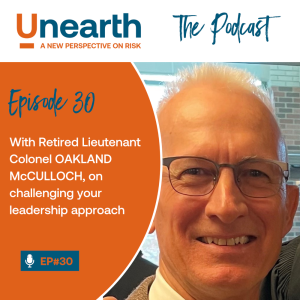
Saturday Nov 05, 2022
Saturday Nov 05, 2022
If you looked at your leadership style (or your managers/executives), on a scale is it authoritarian or chaotic? At the authoritarian end, you may find intimidation and micromanagement are present, whereas the other end of the scale, it is somewhat chaotic, where you have given your people the tools and mechanisms to create some magic, even though it might appear to many outsiders as somewhat messy. Perhaps you are somewhere in between.
My guest this week is Lieutenant Colonel Oakland McCulloch, U.S. Army (Retired) and one of the points we discuss is the authoritarian to chaos scale. Oak is incredibly passionate about leadership and knew early on in his life that he wanted to step forward into a leadership role. Oak’s 23-year career in the Army saw him hold numerous leadership positions in the Infantry and Armor branches. He also assisted in disaster relief operations for Hurricane HUGO in Charleston, South Carolina, and Hurricane ANDREW in south Florida.
Even though Oak and I may reside of different sides of the world, we are both seeing the issues associated to lack of leadership and trust within business and government. Not to mention that employee disengagement at an all-time high, and the risks associated. A call for strong and courageous leadership is needed to help turn the tide.
Oak and I openly discussed some of the different styles of leadership and how the military are often viewed as a ‘command and control’ style of leadership. Oak shared his own experience of how it was his team, his people, that helped shape his leadership style.
To help provide some context of Oak’s journey, during his time in the US Army, some of Oak’s deployments included Operation Desert Shield/Desert Storm in Saudi Arabia and Iraq as a Generals Aide-de-Camp, the Congressional Liaison Officer in support of operations in Bosnia and the Operations Officer during a Peace Keeping deployment to Kosovo.
Oak then stepped forward to help develop future leaders, as he took on various positions within the US Army and Charities, like Bay Area Food Bank and Mobile Rotary International Club.
In October 2013, Oak became the Recruiting Operations Officer for the Eagle Battalion Army ROTC program at Embry-Riddle Aeronautical University where he more than doubled the size of the program in 6 years. Cadet Command selected LTC Oakland McCulloch as the top recruiting officer, out of 274 recruiters in 2019.
In February 2021, Oak published his first book, titled, “Your Leadership Legacy: Becoming the Leader You Were Meant to Be”.
During our discussion, Oak and I also touched on points like:
- Where your best ideas can come from – “somebody who you think is a superstar will give you some stupid ideas, and somebody who you think is your weakest link in your organisation is going to give you an amazing idea.”
- How fear associate to risk management and control can impede your people.
- Fear associate to making mistakes… then how do people learn?
- Risk adverse and micromanage… stifle creativity and people taking initiative.
- Why the saying “that is the way we have always done it” hits a nerve.
- Difference between mistake and failure to learn.
- The only way to achieve a result of your mission or objective is with and through your people.
- Are you setting people up for success or failure?
- Pitfalls around culture.
With future challenges, threats, and risks ahead of us, now is the time for strong and courageous leadership. It is only by uniting and engaging people that we can deliver our best. Our future is begging for courageous leaders to build a path towards it. The leaders we need are not called to leadership by a job title, but by what they hold to be important. What matters to them that they are prepared to make a stand on. This is leadership that requires courage and vision and a clear sense of identity. Are you ready to step forward?
To learn more about Unearth and it's team, visit www.unearth.com.au.
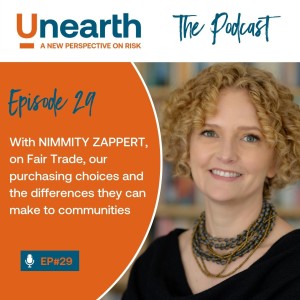
Monday Sep 26, 2022
Monday Sep 26, 2022
Supply-chains are important to all businesses, regardless of their size. And within risk management, supply-chains can often a point of challenge. Not just having access to goods and resources, but also ensuring the goods received are of the quality and from the source expected.
I can’t tell you how many times I have spoken with businesses who have been exploited by not receiving the goods they were expecting, often associated to quality or the source.
Today, we don’t have the transparency we might like around goods we purchase, impeding our ability to make more informed decisions. More and more both people, families, and businesses are seeking that transparency around purchasing choices to be in-line with their beliefs or as part of their social responsibility. And with the number of businesses that are ‘greenwashing’, it makes it difficult for anyone to be sure of the statements being promoted by suppliers.
If you are not familiar with ‘greenwashing’, it is where disinformation disseminated by an organisation to present an environmentally responsible public image.
In this Podcast episode, Nimmity Zappert, the Founder of All of the Good Things, and the Chair of the Fair Trade Association ANZ, shares her remarkable journey from working in the corporate sector with 25+ year of senior management experience within the software industry, to her focus on ethical supplies and a more transparent (and connected) supply chain.
Nimmity’s journey has seen her work take her across a broad international landscape, including working in Africa, the Middle East, Europe (including Russia and Central Europe), Scandinavia, Asia, and the Americas. As well as providing fantastic experiences exploring the world, these experiences also highlighted the extreme contrast between her living and traveling circumstances, to those she saw in her travels. This ignited Nimmity’s passion for levering her business experience for good.
During my discussion with Nimmity, we touch on a number of points, including:
- The challenge of knowing what is happening within the supply chain.
- The ability to do be able to make informed purchasing choices and to be able to do the right thing, without it being so hard.
- The need for greater transparency and accountability.
- The direct connection to the person who created the product item and how your purchase directly affects them, their family and community.
- The Fair Trade Association and Movement, and its 60 year history, plus other social enterprises, like B Corp.
- Knowing who to trust, and the challenges of self-certifications verses credible entities.
- Cynicism being the biggest danger.
- The tone of the sector becoming more intense… but doing good, doesn’t have to always be a fight.
- The power of people and the power of choice.
- Back to basics, everyday kindness.
We all have a role to play in this. Either we can remain silent and allow limited transparency in relation to quality and sourcing of products and supply chain, plus remain quiet as the ‘greenwashing’ continues. Which means we continue to be exposed to the associated risks. Or, let our voices and our choices create new opportunities to improve supply chains. Not just in relation to social enterprises, but all enterprises and businesses. Supply chain transparency and accountability needs to improve as whole, because if we don’t, the exposure and cost is far too great. Not to mention, by continuing with the norm, our silence, this translates to our acceptance.
If you woud like to learn more about Unearth or Lisa Sisson, make contact through https://unearth.com.au/contact-us/. We would welcome the opportunity to speak with you.
